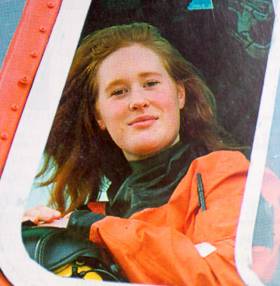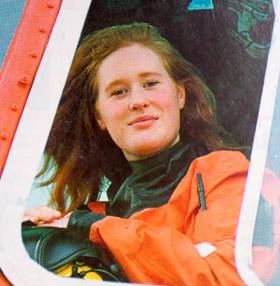Displaying items by tag: Dara Fitzpatrick
A Sligo Bay RNLI helm has been celebrated as a finalist for the inaugural Captain Dara Fitzpatrick Award, hosted by the Irish Paramedicine Education and Research Network (IPERN).
Eithne Davis was nominated for the award by her lifeboat station team and, having been selected as a finalist, she attended a special ceremony at the University of Limerick on Wednesday (8 March) to mark International Women’s Day.
Five finalists were shortlisted by the IPERN Equality, Diversity and Inclusion Special Interest Group to award and recognise an inspirational female colleague working in the Irish pre-hospital community.
Frances Griffin of the National Ambulance Service picked up the award, which pays tribute to Captain Dara Fitzpatrick’s powerful legacy. Eithne was among the five finalists selected for embodying Dara’s values of compassion and kindness, strength and bravery, leadership and teamwork, and professionalism.
In submitting Eithne’s nomination, Sligo Bay RNLI said the station had a proud history of a strong representation of female crew.
“Eithne joined Sligo Bay RNLI at its inception in April 1998 and has been a steadfast member of the team since,” it said. “Her volunteering role with the RNLI spanned her life stages of rearing a young family, through various jobs and roles, to this year completing her doctorate in environmental studies. Over the past 25 years in all circumstances, she has carried her RNLI pager and been on call ready to launch to those in need of help at sea.
“She has been an outstanding member of the crew, was appointed our first female Helm in 1999, is a seagoing casualty carer and most recently was appointed as the station’s first local trainer and assessor. Of significance also is the fact that she was the first ever RNLI-retained inshore lifeboat mechanic in the fleet.
“In her 25 years, she has launched on service 164 times, involving 169 hours at sea, trained at sea for over 396 hours, and has been directly involved in the saving of nine lives, not to mention the other 131 people she has assisted, many requiring casualty care.
“Launching in an open lifeboat always requires bravery, but Eithne would not consider herself as anyone special. In one incident in very rough weather, when responding to a surfer in difficulty, the lifeboat slammed hard off a large wave and Eithne was injured.
“She pressed on with the callout towards the casualty only to stand down on notification that the person had gotten ashore safely. Eithne took a couple of weeks off to recover and then was back on the lifeboat as eager as always. If queried, her self-effacing attitude would likely be, ‘Sure it’s what we do, isn’t it?’”
UK Company Names Helicopter After Late Capt Dara Fitzpatrick
#Rescue116 - British SAR contractor Heli Operations has named its latest helicopter in tribute to Capt Dara Fitzpatrick, who died in the Rescue 116 tragedy earlier this year.
The Westland Sea King HAS.5, codenamed ZA116, will bear the name Dara with the full support of the Fitzpatrick family.
In a tweet with the news yesterday evening (Saturday 9 December), Dorset-based Heli Operations said it “has a long working relationship” with the Irish Coast Guard “and many of our crews worked with Capt Dara Fitzpatrick.”
Capt Mark Duffy, winchman Ciarán Smith and winch operator Paul Ormsby also died after their Sikorsky S-92 went down at Black Rock, west of Blacksod on the Mullet Peninsula, in the early hours of 14 March 2017.
The bodies of Smith and Ormsby have not been recovered, though items of their survival gear were found in late September.
#HeliOperations is delighted to announce that the Family of Dara Fitzpatrick have supported the naming of our new helicopter #ZA166 as "Dara" - #HeliOps has a long working relationship supporting #IrishCoastguard and many of our crews worked with Capt Dara Fitzpatrick. pic.twitter.com/I9ey40G2xN
— HeliOperations (@HeliOperations) December 9, 2017
#Rescue116 - Tributes have poured in for Dara Fitzpatrick, the senior pilot who lost her life in yesterday’s Irish Coast Guard helicopter incident off Blacksod in Co Mayo.
Speaking to RTÉ Radio 1’s Morning Ireland earlier, sister Niamh Fitzpatrick, praised Dara’s love for her coastguard job “because she loved helping people”, as TheJournal.ie reports.
“It never occurred to Dara that she shouldn’t do this [type of work] because she was female, it wasn’t easy for her crew or her to be the only female in a male environment, but she was excellent at [her job],” said Niamh, a broadcaster with Today FM, who joined her family in vigil in Castlebar overnight.
President Michael D Higgins echoed those sentiments, saying in a statement: “We are all grateful for the courage, resolution and exemplary commitment to the aims of the Cost Guard that Capt Fitzpatrick and her colleagues have consistently displayed.”
Dara Fitzpatrick was one of the Irish Coast Guard’s most experienced officers, and one of the first women to fly for the Irish Coast Guard’s precursor, the Irish Marine Emergency Services.
Longtime Afloat readers will also recall the feature in June 1994 that highlighted Dara as a then 22-year-old co-pilot on helicopter rescues, four years after she began flying.
More recently, in 2013, Afloat.ie covered Capt Fitzpatrick’s pioneering missions as part of Ireland’s first all-female SAR helicopter crew.
Meanwhile, The Irish Times reports that searches continue off Blacksod in North Mayo today (Wednesday 15 March) for Capt Fitzpatrick’s three missing crew mates from Rescue 116 — who have been named as chief pilot Mark Duffy, from Dundalk, and winch men Paul Ormsby and Ciarán Smith, both from North Co Dublin.































































